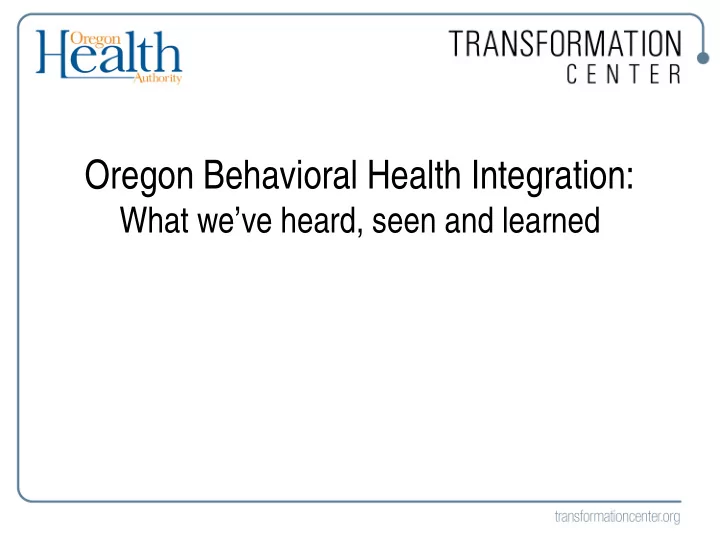

Oregon Behavioral Health Integration: What we’ve heard, seen and learned
Integration Environmental Scan • OHSU qualitative research, five geographically dispersed CCO communities. • Additional 30+ site visits, CCO and provider interviews. • Informed by stakeholder groups NAMI, IBHAO, CHA, OPCA, BHH-LC, • Oregon Innovation Café, Behavioral Health Affinity Group. 8/4/2015 2
Integration Initiatives Provider and Payer Initiatives OHA Initiatives PCPCH Institute CCO Oregon Children’s IBHAO Health Alliance & OPIP Behavioral Health Home Tiger Learning Collaborative Local CCO Teams Project Initiatives ECHO Youth Services CCI Fellow WRAP OPCA Projects OHSU SBIRT SBIRT OPAL-K SBIRT Q-Corp QI Consultation Payment Models Initiatives Environmental Scan
High Level Findings • Lives are being impacted and saved . • Some degree of implementation in most communities, but still limited population penetration. • Wide variability in the degree of implementation, from system-wide to beta testing. • Variation in practice models and strategies. • Ongoing regulatory, reporting, and financial silos • Common set of barriers and requests for assistance. • Opportunities for much more shared learning
Models and Strategies • Levels of Integration o Coordinated o Co-located o Embedded • Delivery strategies o Single organization o Dual or multiple organizations • Behavioral Health Homes 8/4/2015 5
Challenges • Reimbursement / sustainability • Communications • Work Force • Project management capacity / Change fatigue • BH specialty care and BH Homes • Data and analytics • Health Neighborhoods
Reimbursement /Sustainability o Complexity and confusion about billing rules o Continuing budget and regulatory silos o Codes and billing systems not integrated o BH vs. HB o Credentialing o Non-billable services (no codes) o CCM model needs to be adopted by commercial payers o Alternative payments models need to be accelerated 8/4/2015 7
Communications o Confidentiality regulations o Misconceptions about confidentiality regulations o Less developed BH IT systems o Non-aligned EHR systems 8/4/2015 8
Workforce o Practice cultures o Practice redesign and provider retraining o Provider capacity / access o Psychiatry gap (adult and child) 8/4/2015 9
Data and Analytics • Dearth of integration metrics. • Tools to capture the value of integration. • Encounter-based data reporting requirements. • Burden of non-aligned reporting requirements. 8/4/2015 10
Behavioral Health Home Learning Collaborative
Project goals • Goal: Improve the health of persons with Severe and Persistent Mental Illness and Substance Use Disorders. • Methods : Training and on-site practice coaching. • Objectives: Adopt & adapt PCPCH principles & practices in behavioral health settings. Apply Continuous Quality Improvement tools to improve specific health conditions. • Examples: Improve screening for unmet physical or behavioral health needs. Create registries of clients in need of integrated care. Promote team-based care across primary care, mental health and addictions treatment.
Participating Project Sites Organizations Locations • Bridgeway Recovery Services Salem • Cascadia Behavior Health Portland • Lifeworks NW Portland/Hillsboro • Options for Southern OR Grants Pass • Eastern Oregon Alcoholism FND. Pendleton • Community Health Services Benton & Linn Co. • Community Health Alliance Roseburg • Lane County Behavioral Health Eugene • Old Town Recovery Center Portland • La Clinica Medford • Willamette Family Inc. Eugene • Center for Family Development Eugene • Mid-Columbia Center for Living Hood River
Techn hnical A Assi sistanc nce Strateg egies es • Integration Coding and Billing Advisory Group • Develop issue briefs & guidelines for billing in an integrated model. • Develop a communication plan for disseminating billing information. • Develop recommendations for modification to rules that inhibit or could facilitate integration. • BH Information Sharing Advisory Group • Develop issue briefs & guidelines. • Develop a consent template. • Create a website and provide a 3-part webinar series .
TA Strategies Continued • PCPCH Integration Standards Advisory Committee • Develop BH standards in Primary Care. • Develop Behavioral Health Home Standards. • Crosswalk with CCBHC criteria • BHI Regional Consultants and Practice Coaches • Contract with regional practice enhancement specialists to provide TA to CCO’s and practice groups. • Develop curriculum to support training of existing practice facilitators. • Information Technology and Telehealth Support • Scale Project Echo pilot. • Explore expansion of OPAL-K availability. • Telehealth patient assessment and treatment.
TA Strategies Continued • BHI Work Force Development • Confer with professional schools on curriculums. • Promote opportunities for CME/ CEU training. • Collaborate with OHPB Board Workforce Committee. • Integrated Health Community Engagement • Link CHIP & CAC leaders interested in BH wellness. • Work with AMH Office of Consumer Affairs to enhance to address BH stigma barriers. • Link with OHPB Medicaid Advisory Committee. • Integration Analytics Advisory Group
TA Strategies continued • BHI Learning Library • One-stop site for information, but no wrong door • Includes articles and tools • links to a myriad of online resources, e.g. SBIRT • Podcast interviews • Webinars and virtual site visits focused on the nuts and bolts details of implementing integrated care.
Questions & Comments
Recommend
More recommend